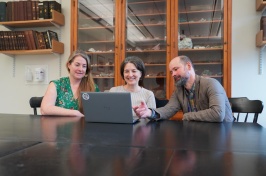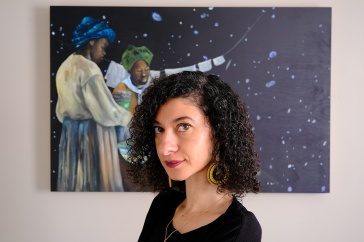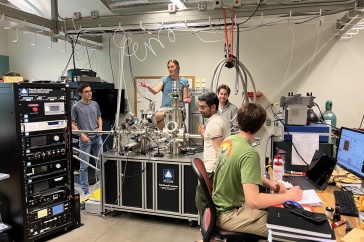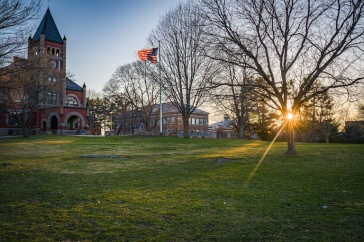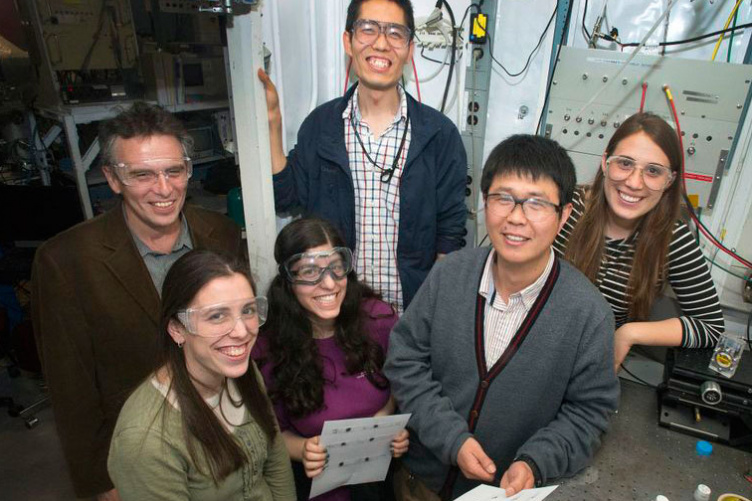
Chances are, you’ve never heard of novel nanocatalysts – but, in the world of green energy, they’re kind of a big deal. Equally significant is that a couple of UNH undergraduates spent last weekend experimenting with them at a national laboratory.
The two students, juniors Emily Wong and Logan Mower, were the first of what chemical engineering professor Xiaowei Teng hopes is a new tradition of collaborative undergraduate research at the Brookhaven National Laboratory in Upton, NY. Trips like this one are about more than just dazzling equipment, though. Teng wants to show students what’s possible with a career in science.
“It lets them know when they graduate that there are lots of options,” said Teng. “There are tons of research facilities waiting for them if they want to become a professional in this field.”
Brookhaven is one of the most prestigious labs in the country, and – because it’s federally funded – anyone with a strong enough research proposal can use it for free. Teng worked there before coming to UNH in 2008, so he knew it was also one of only two labs in the county equipped to provide the mathematical modeling necessary for his project.
Teng is collaborating on an ongoing research project with Anatoly Frenkel, a physics professor at Yeshiva University in New York City. The two are studying ways to use nanocatalysts – tiny particles that jump-start chemical reactions – to make more efficient ethanol fuel cells.
Teng and Frenkel met each other while Teng was working at Brookhaven, and knew they wanted to include students, both graduate and undergraduate, in their work. Last weekend, they saw that dream realized when seven undergrads – two from UNH and five from Yeshiva – arrived at Brookhaven.
Wong, a chemical engineering major, has already been working on aspects of the project as an undergraduate research assistant here in Durham. The trip to Brookhaven, she said, was a “huge opportunity” that allowed her to see practical applications of theories she’d learned in the classroom.
“Going to the lab made me understand more about the research I’m doing now,” she said. “It makes it more meaningful. I’m glad I get to take the information from this trip and teach it to others.”
Research space at Brookhaven is a coveted commodity in the scientific community, something the students soon learned means that work happens at odd hours of the day. The UNH and Yeshiva teams met at the lab late Friday evening, and didn’t leave until early the next morning.
After completing a required orientation course, the students split into two groups – one with Teng and the other with Frenkel. The teams took turns working on their experiment in the lab and participating in lectures in a nearby conference room.
“We were working together until maybe 2 a.m,” Wong said “It’s really a serious environment... There were a lot of people there working at all hours, very focused on their work.”
The odd hours and constant work continued through Sunday. Wong was tired when she returned to campus, but said losing a little sleep was worth the experience. “This is really important,” she said. “Not everyone has this opportunity.”
Teng hopes more undergraduates will get to witness life inside Brookhaven. His grant includes about $10,000 to support undergraduate research over the next three years. Although there are no fees to use the lab, he doesn’t want enthusiastic, willing students to have to worry about the cost of meals, travel and hotel rooms. Instead, he wants them to focus on how their scientific skills might serve them after graduation.
“The trip to me is not to complete just one specific project,” he said. “More important it’s to emerge students in this community of all these professionals.”
Originally published by:
UNH Today
Written by Meg Heckman. Courtesy photo.
-
Written By:
Staff writer | Communications and Public Affairs






























